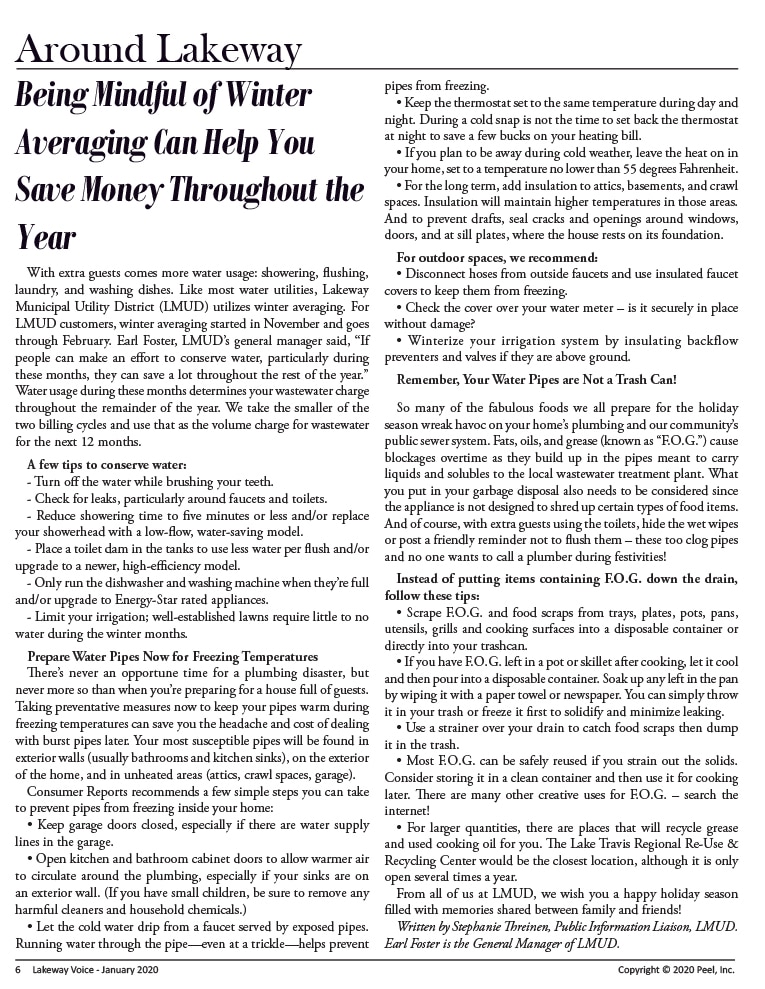Being Mindful of Winter Averaging Can Help You Save Money Throughout the Year

As published in Lakeway Voice, January 2020.
Being Mindful of Winter Averaging Can Help You Save Money Throughout the Year
With extra guests comes more water usage: showering, flushing, laundry, and washing dishes. Like most water utilities, Lakeway Municipal Utility District (LMUD) utilizes winter averaging. For LMUD customers, winter averaging started in November and goes through February. Earl Foster, LMUD’s general manager said, “If people can make an effort to conserve water, particularly during these months, they can save a lot throughout the rest of the year.” Water usage during these months determines your wastewater charge throughout the remainder of the year. We take the smaller of the two billing cycles and use that as the volume charge for wastewater for the next 12 months.
A few tips to conserve water:
- Turn off the water while brushing your teeth.
- Check for leaks, particularly around faucets and toilets.
- Reduce showering time to five minutes or less and/or replace your showerhead with a low-flow, water-saving model.
- Place a toilet dam in the tanks to use less water per flush and/or upgrade to a newer, high-efficiency model.
- Only run the dishwasher and washing machine when they’re full and/or upgrade to Energy-Star rated appliances.
- Limit your irrigation; well-established lawns require little to no water during the winter months.
Prepare Water Pipes Now for Freezing Temperatures
There’s never an opportune time for a plumbing disaster, but never more so than when you’re preparing for a house full of guests. Taking preventative measures now to keep your pipes warm during freezing temperatures can save you the headache and cost of dealing with burst pipes later. Your most susceptible pipes will be found in exterior walls (usually bathrooms and kitchen sinks), on the exterior of the home, and in unheated areas (attics, crawl spaces, garage).
Consumer Reports recommends a few simple steps you can take to prevent pipes from freezing inside your home:
- Keep garage doors closed, especially if there are water supply lines in the garage.
- Open kitchen and bathroom cabinet doors to allow warmer air to circulate around the plumbing, especially if your sinks are on an exterior wall. (If you have small children, be sure to remove any harmful cleaners and household chemicals.)
- Let the cold water drip from a faucet served by exposed pipes. Running water through the pipe—even at a trickle—helps prevent pipes from freezing.
- Keep the thermostat set to the same temperature during day and night. During a cold snap is not the time to set back the thermostat at night to save a few bucks on your heating bill.
- If you plan to be away during cold weather, leave the heat on in your home, set to a temperature no lower than 55 degrees Fahrenheit.
- For the long term, add insulation to attics, basements, and crawl spaces. Insulation will maintain higher temperatures in those areas. And to prevent drafts, seal cracks and openings around windows, doors, and at sill plates, where the house rests on its foundation.
For outdoor spaces, we recommend:
- Disconnect hoses from outside faucets and use insulated faucet covers to keep them from freezing.
- Check the cover over your water meter – is it securely in place without damage?
- Winterize your irrigation system by insulating backflow preventers and valves if they are above ground.
Remember, Your Water Pipes are Not a Trash Can!
So many of the fabulous foods we all prepare for the holiday season wreak havoc on your home’s plumbing and our community’s public sewer system. Fats, oils, and grease (known as “F.O.G.”) cause blockages overtime as they build up in the pipes meant to carry liquids and solubles to the local wastewater treatment plant. What you put in your garbage disposal also needs to be considered since the appliance is not designed to shred up certain types of food items. And of course, with extra guests using the toilets, hide the wet wipes or post a friendly reminder not to flush them – these too clog pipes and no one wants to call a plumber during festivities!
Instead of putting items containing F.O.G. down the drain, follow these tips:
- Scrape F.O.G. and food scraps from trays, plates, pots, pans, utensils, grills and cooking surfaces into a disposable container or directly into your trashcan.
- If you have F.O.G. left in a pot or skillet after cooking, let it cool and then pour into a disposable container. Soak up any left in the pan by wiping it with a paper towel or newspaper. You can simply throw it in your trash or freeze it first to solidify and minimize leaking.
- Use a strainer over your drain to catch food scraps then dump it in the trash.
- Most F.O.G. can be safely reused if you strain out the solids. Consider storing it in a clean container and then use it for cooking later. There are many other creative uses for F.O.G. – search the internet!
- For larger quantities, there are places that will recycle grease and used cooking oil for you. The Lake Travis Regional Re-Use & Recycling Center would be the closest location, although it is only open several times a year.
From all of us at LMUD, we wish you a happy holiday season filled with memories shared between family and friends!
Written by Stephanie Threinen, Public Information Liaison, LMUD. Earl Foster is the General Manager of LMUD.



 You are now being redirected to the WaterSmart page.
You are now being redirected to the WaterSmart page.